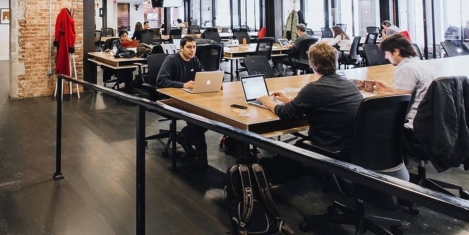June 27, 2018
Location of workplace most important factor in attracting UK job seekers
 The most attractive factor for UK job seekers when choosing a new employer is the location, claims the latest Global Talent Monitor report from Gartner. The report warns that employers are facing some challenges in retention as just 27.2 percent of UK employees in 1Q18 reported a high intention to stay with the organisation, down 5.5 percent from the same period last year. The UK had the fourth largest decrease after France, Singapore and Germany and those that are at the highest risk of leaving are those aged between 18-29 and 30-39 who have completed an MBA. The biggest attraction-drivers for UK job seekers are location (53.5 percent), vacation (43 percent), work-life balance (41.9 percent), camaraderie (41.4 percent) and produce or service quality (41.4 percent). (more…)
The most attractive factor for UK job seekers when choosing a new employer is the location, claims the latest Global Talent Monitor report from Gartner. The report warns that employers are facing some challenges in retention as just 27.2 percent of UK employees in 1Q18 reported a high intention to stay with the organisation, down 5.5 percent from the same period last year. The UK had the fourth largest decrease after France, Singapore and Germany and those that are at the highest risk of leaving are those aged between 18-29 and 30-39 who have completed an MBA. The biggest attraction-drivers for UK job seekers are location (53.5 percent), vacation (43 percent), work-life balance (41.9 percent), camaraderie (41.4 percent) and produce or service quality (41.4 percent). (more…)















 One in four workers (28 percent) would move jobs if they weren’t allowed to work from home, increasing to nearly half (45 percent) of millennial workers. Yet while two thirds of UK employees (65 percent) can work from home, 35 percent are still not given the option of working remotely.
One in four workers (28 percent) would move jobs if they weren’t allowed to work from home, increasing to nearly half (45 percent) of millennial workers. Yet while two thirds of UK employees (65 percent) can work from home, 35 percent are still not given the option of working remotely. 


 More than a quarter of managers (27 percent) in British companies would likely accept a salary cut to work for a company that has a clear purpose beyond profit a new report claims. A third (32 percent) would actually consider leaving their job if a greater purpose was unclear, while more than half (53 percent) would if their company’s values and purpose didn’t align with their own. The YouGov survey, commissioned by Danone UK, highlights the importance of having a defined company purpose that marries commercial success with social progress. The findings support a new report by not-for-profit think tank Tomorrow’s Company and Danone UK, that explores the importance of having a purpose beyond profit in helping companies to prosper in the face of workplace challenges created by an uncertain world.
More than a quarter of managers (27 percent) in British companies would likely accept a salary cut to work for a company that has a clear purpose beyond profit a new report claims. A third (32 percent) would actually consider leaving their job if a greater purpose was unclear, while more than half (53 percent) would if their company’s values and purpose didn’t align with their own. The YouGov survey, commissioned by Danone UK, highlights the importance of having a defined company purpose that marries commercial success with social progress. The findings support a new report by not-for-profit think tank Tomorrow’s Company and Danone UK, that explores the importance of having a purpose beyond profit in helping companies to prosper in the face of workplace challenges created by an uncertain world. 











June 13, 2018
US companies are waking up to the benefits of caring for employee mental health
by Colleen O'Day • Comment, Wellbeing
(more…)